The wonderful folks at the BBC have given me access to their BBC Global iPlayer for a month to give the service a go and trawl through the archives. I’ll have some thoughts on the service at the end of the month, but I thought I’d also take the opportunity to enjoy some of the fantastic content.
My expert would totally disprove that.
Who is your expert?
I don’t know, but I can get one by this afternoon. The thing is, you’ve been listening to the wrong expert. You need to listen to the right expert. And you need to know what an expert is going to advise you before he advises you.
– Malcolm explains how advisers work to Hugh
In its sophomoric three-episode season, The Thick of It remains a shrewdly-observed and immensely funny political satire. It’s a very British send-up of the sort of idealism inherent in drama like The West Wing, a show where everything is so murky and uncertain that the script is highly improvised and even the camera wobbles. While it’s still as funny as it was in its first season, though, I have to confess that the second season didn’t quite grab in the same way. The first season represents one of the most cynical explorations of mainstream politics that I have ever seen, but it actually seems relatively optimistic when measured against this much more scornful second cluster of episodes.
That’s not to say that there aren’t some wonderful moments here. Indeed, there are quite a few sequences that deserve to stand alongside the very best of the first season. I love, for example, Hugh Abbot’s observation on the new building that his department has been assigned. “It’s like a sort of a government mall,” he suggests, and it’s alarming how many Irish government departments look just as depressingly “same-y” and generic. The email fiasco in the final episode is absolutely brilliant, as is Abbot’s incredibly childish competition with fellow government minister, Julius Nicholson.
In fact, the second episode rather brilliantly explores how ridiculously petty the higher level government departments can be, with Hugh stubbornly insisting on holding his same social mixer on the same night as Nicholson’s party. Confronted with the fact that he has twelve guests confirmed, Abbot refuses to face the music and insists, “We’re planning on doing a lot of business on the door.” The party is brilliantly cringe-worthy, and arises entirely from Abbot’s stubbornly childish inability to back down from his initial position.
At another point, Abbot bemoans returning from his holiday to a Select Committee hearing. He asks Glenn to reschedule, but Glenn points out that the dates are fixed. Like a petulant child, Abbot moans, “How did Liam get his changed so he could get to the bloody Test match?” In fact, centralising government and placing several departments within one building seems to exist merely so Malcolm Tucker can more efficiently manage the over-sized kindergarten that is the British government.
However, there is something more fundamental and more subtle missing from these three episodes. I think it’s the characters. Having had a year to settle into the roles, the actors are far more comfortable playing the government officials. Unfortunately, that means that they’ve also rigidly defined their characters. While Minister Hugh Abbot and his staff weren’t especially likeable in the first season, here each and every one of them becomes distinctly and thoroughly dislikeable. They were always inefficient and over-confident, but now they seem mean and lazy and incompetent.
Olly takes advantage of his girlfriend to cement his standing in his own party, and then dumps his own Minister in hot water to get in Malcolm’s good books. He even makes fun of Glenn’s special needs son, to make him seem like more of an ass. Terri was always a bit bitchy, but she was also the most level-headed of the group in the previous season. Here she exists as a whiny and completely self-centred pain in the backside. Abbot and Glenn aren’t just accidentally and awkwardly insensitive about the death of Terri’s father, they openly joke about it behind her back. In short, the audience goes from pitying the cast to actively hating them, and it can’t help but feel a little bit shallower for that.
This was, of course, the last season to feature Chris Langham as the put-upon Minister Hugh Abbot. His conviction for possession of child pornography somewhat overshadows the good work he does in the role, crafting a somewhat pitiable and befuddled elected official in the middle of a system he doesn’t quite understand. It’s especially hard to divorce Langham from the real-life scandal because so his final episode features two plots involving children.
That said, it does feel like a fitting place to leave the character of Hugh Abbot. After all, the second season establishes that the character actually has one principle. He’s a weak-willed coward, and he won’t stand up for it, but he seems to genuinely care for kids with special needs education. “I’m going to go in to the PM and tell him straight up: this bill is a load of old bollocks!” Abbot insists to his most trusted advisor. “No you’re not,” Glenn informs him, curtly. “No I’m not,” Abbot concedes, “but it’d be great if I did, wouldn’t it?”
Abbot’s massive failure on the one issue he cares about, and the personal betrayal of the one person he considers to be his friend, represents a fitting conclusion for the Minister’s character arc. While it isn’t the tidiest departure in the history of the BBC, it does at least wrap up relatively neatly. It seems almost oddly appropriate that we never see Abbot again after this season, if only because it feels like he has been well and truly crushed by the system of government, in stark opposition to the glee he demonstrated in his first scene.
Meanwhile, it appears that the cast and crew figured out that the breakthrough character from the show was Malcolm Tucker, the vicious public relations manager for the government, with a mouth like a drunken and aggressive but articulate Scottish sailor. “Get the f*** in or f*** the f*** off,” he insist at one point, literally managing to insert another swear word into a swear word. He’s a guru and a legend, and the most efficient and effective character in the show.
Despite being belligerent and adversarial, he also shows true moral character and a willingness to defend his beliefs, becoming something of a heroic character despite his somewhat cynical outlook. “You know me,” he explains at one point, “I’m a man of principle. I like to know if I’m lying to save a tosser or a moron.” He might be joking, but there’s a note of truth to the statement, and strange ironic nobility to his character. “How does he do that?” Abbot asks. “It’s spooky. He’s like a bad Gandalf.” Hell, he is even considerate enough to be aware of Glenn’s special needs child, something that Olly has been completely unaware of despite working with the guy for so long.
Capaldi is, once again, brilliant as the sultan of spin, the Alistar-Campbell-by-way-of-Harvey-Weinstein media-manager. And the show seems to recognise that Capaldi is giving a truly transcendental performance – or, as his character would likely phrase it, a “transcend-f***in’-dental” performance.
There’s a stronger emphasis on the character this time around, with Olly even spending the first episode on rotation to 10 Downing Street and Robyn competing to attend Tucker’s early-morning briefings as a sign of status. Langham’s disgraced departure would really pave the way for the team to centre the show around Malcolm, and develop his character further, but he’s already doing a fantastic job stealing the show. Given the considerable comedic talents of the rest of the cast, that’s quite an accomplishment.
It’s a shame that the second season doesn’t quite live up to the first. It just seems like a bit of the nuance was lost, and the cast and crew felt the need to amp up the cynicism on a show that was already one of the most cynical comedies on television. Still, there are moments of sheer madcap mayhem captured here – any show that can manage a scene like Malcolm’s “circle jerk” to take down Julius Nicholson’s political ambitions with such style, energy and verve is well worth your time.
You might be interested in our other reviews of The Thick of It:
- Series 1
- Series 2
- Rise of the Nutters
- Series 3
Filed under: Television | Tagged: Abnett, art, bbc, bbc global iplayer, BBC iPlayer, Chris Langham, Government of the United Kingdom, Harvey Weinstein, kenneth branagh, Malcolm, Malcolm Tucker, Minister, Television, The Thick of It, the west wing, Thick of It, West Wing |















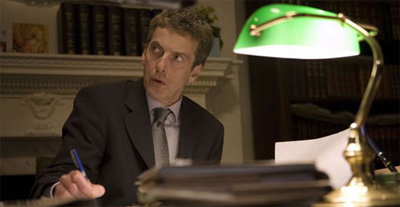
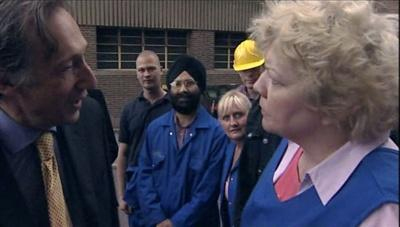
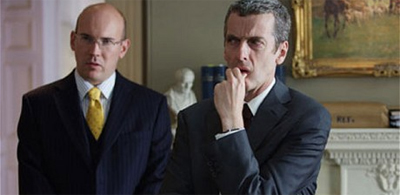
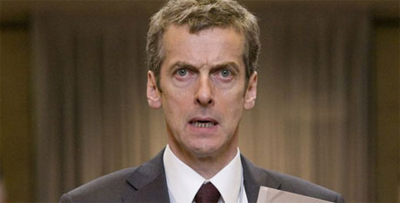
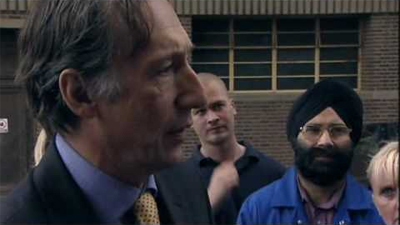
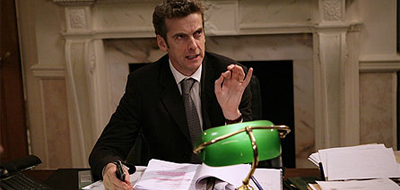
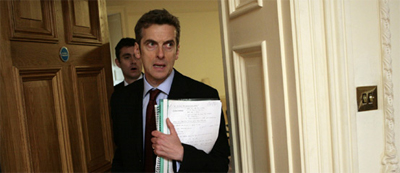





Hugh ABBOT. basic fact-check.
Thank you, diligent netizen. Typo corrected!